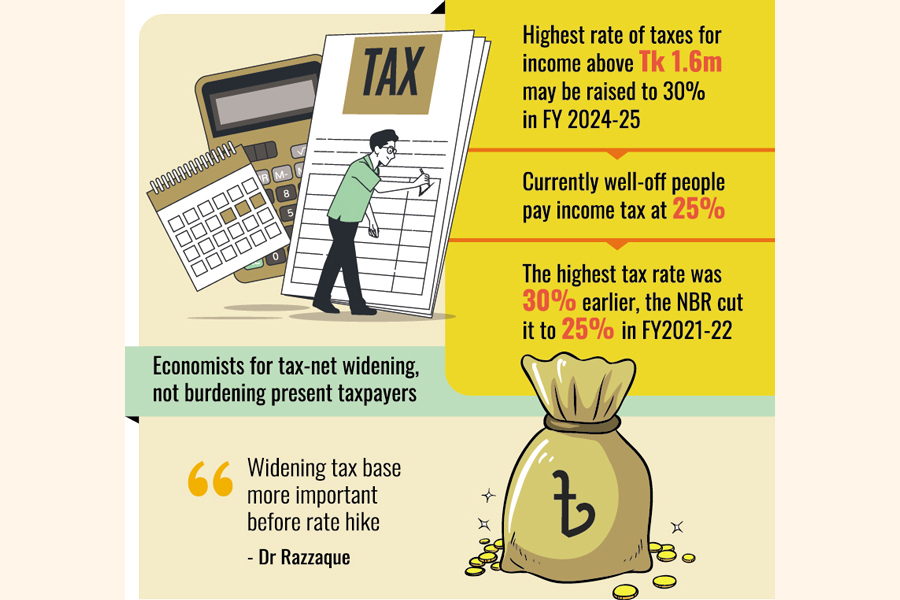
Published :
Updated :

Government's revenue authority plans fiscal measures like raising tax rate on higher-income people to contain gaping income inequality in the country, sources said.
The highest rate of taxes for taxpayers having an annual income above Tk 1.6 million might be revised upward in the budget for the upcoming fiscal year 2024-25.
Currently, following a previous cut, well-off sections of people pay income tax at 25 per cent on the basis of their annual assessed incomes.
The income-tax authority is considering coming round to the tax rate at 30 per cent from next fiscal year, officials have said.
Earlier, the highest tax rate was 30 per cent which the National Board of Revenue (NBR) revised lower to 25 per cent in FY2021-22 to mitigate impact of the COVID pandemic on the economy.
Economist Dr MA Razzaque hails the move as he thinks such revision is good for progressive taxation and narrowing income inequality but widening tax base is more important before the hike.
"Country's tax base is still poor as many people are still not paying taxes or submitting zero-tax returns," says Dr Razzaque, chairman of Research and Policy Integration for Development (RAPID) and Research Director of Policy Research Institute (PRI).
If the government imposes heavy tax burden on the existing taxpayers without widening tax net, honest and regular taxpayers would feel disincentivised, he adds.
"The planned one is a revenue-driven measure, but the government should consider it in equity perspective," the development researcher suggests and lays emphasis on increasing allocations on social-safety net, health and education allowances by boosting revenue collection.
He notes that it is not a wise measure to put pressure on existing taxpayers for mobilising higher domestic revenue.
According to an annual report of the NBR, some 89,290 individual taxpayers have annual income above Tk 1.6 million. They paid Tk 19.63 billion worth of taxes in the fiscal year 2020-21.
Earlier, the Centre for Policy Dialogue (CPD) recommended increasing the tax on high-income individuals to 30 per cent in the next budget in a fiscal measure to reduce income inequality in the country.
In Bangladesh, Gini coefficient, a tool for measuring income inequality within a population, hit a record-high 0.499 in 2022.
Also called Gini index, the inequality gauge is calculated based on the distribution of income or wealth among members of a population, with the index ranging from 0 to 1.
A Gini index of 0 represents perfect equality while 1 implies absolute inequality.
Bangladesh Bureau of Statistics data showed the country's Gini coefficient standing at 0.482 in 2016, indicating that income inequality has gradually risen over the years.
At present, the tax-exempted income limit for individuals is Tk 350,000. However, people with an income of between Tk 350,000 and Tk 450,000 have to pay 5.0-percent tax.
In India, tax-free threshold for individuals is Rs 300,000. People having income above Tk 1.5 million are under the highest tax rate at 30 per cent for FY 2024-25.
However, in India, the rate of inflation that erodes people's income is much lower in the neighbouring big economy. The retail inflation dipped to 4.85 per cent year on year last March, around half in Bangladesh.
Currently, some 4.3 million taxpayers submit tax returns out of 10 million holders of taxpayer identification number (TIN).
Direct tax is considered one of the major state tools to fight income inequality.
doulotakter11@gmail.com


 For all latest news, follow The Financial Express Google News channel.
For all latest news, follow The Financial Express Google News channel.